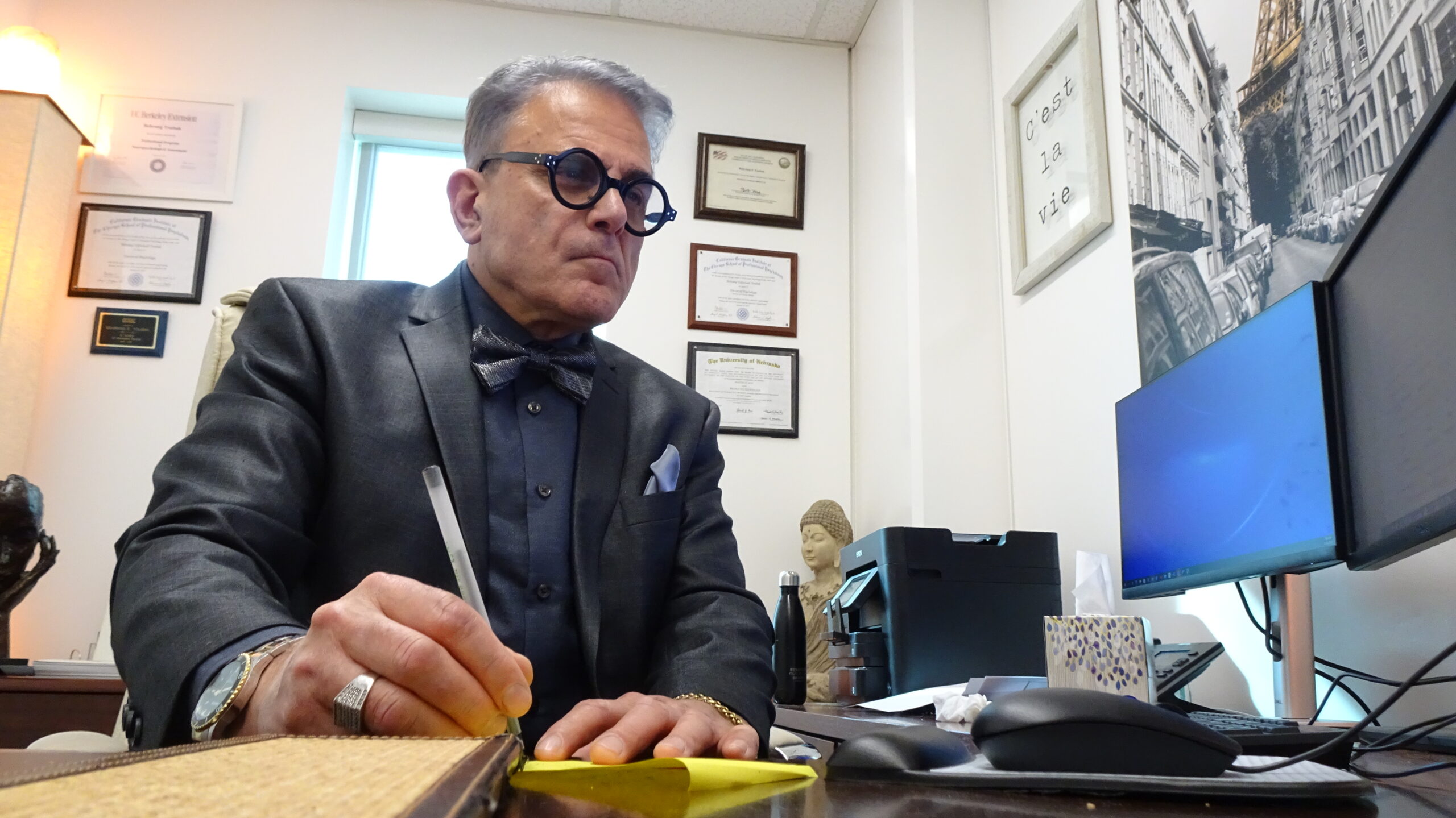Meet Dr. Ben Toubak. Photo by Marcelo Maximilian
By Licia Summerhill Staff Reporter
Walking into the Student disAbility Resource Center at California State University, Dominguez Hills is a treat. The staff member greets visitors by walking outside of her cubicle and meeting them face-to-face with open arms. Waiting to speak with the new director of SDRC, Ben Toubak, I noticed the variety of brochures and pamphlets that surround the front desk. Adjacent to the seating area was a table full of helpful office supplies free for anyone who entered the office.
Toubak came into the waiting room and met me before walking me back to the corner office. The room smelled of aromatherapy and peace. Around the room are peaceful statues and calming art. Toubak has held many positions in his lifetime. As he began discussing the beginning of his career as a professional dentist, Toubak talked about the transitions he has made over the years.
Toubak finished medical school in France as a children’s dentist. He served as a sergeant dentist with the International Medical Group, a humanitarian global institution that works under the protection of the United Nations. Toubak smiles as he recounts the nine years of service he worked as a dentist with warzone training as a medical professional traveling to over 24 different countries.
Toubak recounted, “They were not able to speak the English language, only their local dialogue. For example, in Burma, there they have around 70 different dialogues. Even in the next village, they cannot understand. So the only communication between us, particularly myself, is with the two eyes. They have pain. They show it and I understand that.”
After an accident that left him disabled, Toubak returned to college to study international public health at Loma Linda University. Toubak said, “After I started the program, I finished it but I wasn’t able to understand them. I wished I could help them emotionally, behaviorally and mentally so I applied for the specialty of neuropsychology.”
Toubak began working as a faculty member in the disability office at Santa Ana College. He created a curriculum, student outcomes and objective analysis. After a successful career with the disability office, Toubak was highly sought after for his specialty in drug and alcohol training. He began working for the five jails in Orange County.
“Mostly, I worked with the juveniles because I wanted to help them change their lives,” Toubak said. “The same as for any fresh plant, any direction you hold them, it will grow that way.” His work with the juvenile inmates successfully turned a pilot group of 64 children into productive citizens who did not return to the jail system.
The pilot program was so successful, Toubak was promoted to the Pelican Bay jail, the second-highest security prison. Toubak met with murderers, gang members and terrorists. When asked how he handled the complications of working in the jails, Toubak stated, “I respect them as a human beings. I respect them as a patient, nothing else. That’s the reason I connected with them and gained their trust.”
Toubak paints a picture of his sessions that are similar in nature and compassion. Toubak recounts when he would invite the Pelican Bay inmates into his office. With cameras on and a guard at the door, Toubak smiles as he shows how he interacted with inmates. “‘Sir, please have a seat,’ and the men would say, ‘Do you know how many years I haven’t heard this here? They just look at us, but you call us sir and you say please. No one treats us like that.’” Toubak said about the incarcerated men he worked with.
With only a vest and a guard to protect him, Toubak smiled as he recounted the inmates he has helped in his tenure. Toubak left the jail system to work within the community by helping with an outreach program, but still makes himself available for the people he has connected with over the years.
Toubak’s mentorships have resulted in many successes but perhaps the most personal would be his son who is following in the footsteps of his father’s social justice efforts as a lawyer.
“I believe this kind of program makes a difference in the academic performance of the student,” Toubak said. In his previous position as director of disability services at CSU San Bernandino, Toubak made sure the office had a visual representation of celebrities who have succeeded with disabilities. “We had a lot of posters of very popular celebrities from Jennifer Aniston, Steve Jobs, Oprah, all of them have the same issue or similar issue as you have so this [disability] should not bother you or slow you down,” Toubak said. “You can make it.”
Toubak insists on focusing on a person’s ability, not the disability. Each student is assessed and valued for their abilities and where they need help. “That’s why we need to remove this barrier to stop the obstacle and move forward. No one should be ignored or denied,” he added.
Toubak and his staff are available to assist students with a variety of resources such as accommodations, counseling, mentorship, and a variety of technical resources designed to help you succeed with an academic career with CSUDH.

